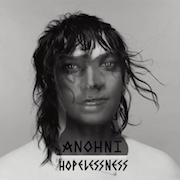As befitting a work titled Hopelessness, Anohni’s new record is a daunting and, at times, relentlessly bleak proposition. Formerly known as Antony, of Antony and the Johnsons, the artist has repurposed her much-praised singing voice to produce a statement that manages to trouble and delight in equal proportions. It was always an intriguing concept, even as a purely on-paper exercise: a transgendered artist known for her delicate torch songs collaborating with electronica producers Hudson Mohawke and Oneohtrix Point Never, arguably two of the most notable trend-setters in their field in recent years. Early interviews indicated a desire to create “a dance / experimental electronic record with quite a dark thematic undertow”, and in this regard Anohni and her collaborators have succeeded.
Listeners familiar with the startling ‘Drone Bomb Me’, a single that saw release in early 2016, will have already had an indication of what form Anohni’s musical departure has taken. Eschewing the largely acoustic arrangements of previous records by Antony and the Johnsons, the singer has favoured bombastic electronic productions, best exemplified by the one-two punch opening of ‘Drone Bomb Me’ and ‘4 Degrees’. Mohawke’s signature sound, with its low brassy build and elastic dynamics, is well utilised, stoking Anohni’s delivery into something fiercely defiant and seductive. She seems vitally alive on every song, playing out a series of politically charged characterisations that engage with anti-capitalist and pro-environmental messages.
Anohni has commented that ‘Drone Bomb Me’ was written from the perspective a young girl in Afghanistan in the wake of losing her family to a drone strike, pleading to have her own life taken in a similar manner. It is a bold topic for what is ostensibly a pop song, and it is to Anohni’s credit that she pulls the performance off without a sense of contrivance or affectation. Hopelessness is peppered with similar exercises, and the singer has dropped hints that the live tour to support the record will also engage in this use of avatars to deal with political themes. The lyrics manage to mix a frankness and glorious ambiguity, nowhere better exemplified by the line “I know you love me because you’re always watching me” in ‘Watch Me’. It is impossible to ignore the implication in the post-Snowden world. It is hard not to feel a laugh catch in the throat.
The music on Hopelessness is impeccably arranged and produced, and there is a sense of genuine care in how the album has been sequenced. The middle section, comprised of ‘Obama’ and ‘Violent Men’, offers a muted and anxious reprieve from the more conventional pop songs that bookend it. The interplay between chiming keys, outbursts of synthetic voices and snares on ‘Violent Men’ recalls Björk’s work on Homogenic or Vespertine. ‘Obama’ is a ponderous assault on the departing president, delivered in a monotone that reinforces the growing disappointment felt by many at his inability to enact genuine and meaningful change.
In contrast to the more experimental moments in the middle, Hopelessness is rife with common pop cues. This is not surprising given Mohawke’s production credentials for mainstream artists, having worked with Kanye West amongst others, and the lyrical content serves to cast the album in the tradition of great political pop gestures, such as those of Marvin Gaye on What’s Going On. In a similar manner Hopelessness repurposes the emotive musical language of popular music to create something that delivers an uncompromising message. It is difficult for the listener not to be swept up in a swell of the familiar, for example when a song like ‘Crisis’ reaches its shimmering crescendo in the form of a keyboard solo. By drawing people in through these devices Anohni underlines the form’s capability to deliver all manner of hard truths, about love and war, and to make it compelling to even the most casual of listeners. While it is hard to imagine Hopelessness finding the success of ‘Get Lucky’ or similar radio fodder, there is something of that blueprint here and perhaps these Trojan songs will find mainstream rotation. It’s an intriguing thought.
As much as critics may contest the lyrical directness of artists like Björk and Anohni when tackling politics, there is something to be said about the necessity for such frankness in these times. It seems to be a common criticism that such work fails to recognise the complex political environment in which we operate, or comes off as naïve, but this seems a fatal misrecognition. It is refreshing to hear an album prepared to confront our complicity, and our hopelessness, in such a direct fashion. There has been plenty of time for bearded boys to pontificate over world events in broad-brush reifications, and perhaps it offers the listener very little in the way of agency. With Hopelessness the messages are clear and direct, even when they present something with an ambiguous flourish, and the question rapidly becomes what is to done in the face of them. If the concept of ‘hopelessness’ is one that feels a common tie for us all, as consumers and thinkers, then perhaps the fundamental point Anohni is driving at is one about the latent potentiality in that collective sense. In the same way, she explores the latent potential of pop structures to explore these themes. Though it is not articulated directly, the heart of this record is about the potential for a genuine and communal response to that hopelessness, and about an empowering, defiant joy that can be forged even in the depths of despair. Soundtrack to a soon unceasing summer.


